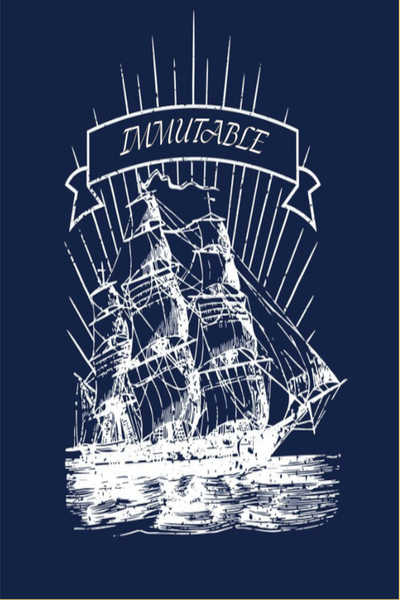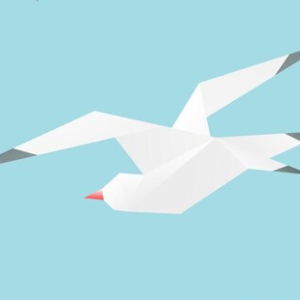Ballast sat on the rocky shore, deep in thought, beside his corpse companion.
He was concerned about the body, though not for the same reason others in his position may have been.
Dead bodies did not scare him. That fear had been worn away by the experiences of his youth, like the dulling of a blade after many uses. A blade’s edge could be resharpened, but if there was something that could return the fear of death in Ballast, he had not yet encountered it.
What worried Ballast was why this body was here. The tattered clothing draped around the mostly skeletal remains bore the same compass rose as his own—a fellow survey sailor, likely a member of the missing Bull’s Horn.
Ballast could not tell how the man died, but it was clear he lived long enough to drag his rowboat beyond the tide’s reach. There were no signs of any other boats—or bodies—nearby. Ballast had looked. He hoped the medic of the Hare’s Breath could deduce more about the cause of death.
Ballast had sent Ernest and Wills, the two deckhands who made up his expedition party, back to their own rowboat with specific instructions. Return to the ship. Send out the return flare to summon the captain and the mapper. Direct the ship to his location and have the captain and medic meet him here.
That was a few hours ago now.
Ballast previously saw the flare go up. The Hare’s Breath should be rounding the island toward him anytime now.
While he waited, he reached for the inside pocket of his jacket and pulled out a dagger. It had belonged to the raider who had pursued him and his mother on that horrible night. Ballast carried it with him wherever he went. His village having been razed to the ground, this dagger was the only memento of his childhood. It was also his only clue to learning the identity of the raiders.
No one who had seen it to this point could tell him where it may have come from, but all thought it unique. The double-edged blade, eight inches in length, was wavy rather than straight, somehow calling to mind both the surface of the sea and a dancing flame. The handle was white and rounded, like bone, except it had a spiraled ridge, which Ballast found helped with gripping. This was not the dagger of some ordinary cutthroat one might encounter in a darkened alley. No, this weapon had belonged to someone more important—and more deadly.
And while the man who had the dagger died that night, his cohorts lived. How many more villages like Ballast’s own had they pillaged since? It was not enough that the man who murdered his mother was dead. Ballast wanted them all dead to ensure they would not commit any more atrocities.
Ballast sheathed the dagger and returned it to his jacket. He could never stand looking at it for too long.
He amused himself for a time watching the gulls. While they had flown away from the beached rowboat when he and the others approached it, they had not gone far. They circled overhead, calling to one another, and occasionally landed nearby before taking flight again. One seemed more brazen than the others, landing just in front of him. He knew some seafarers who would view that as a good omen.
To his left Ballast saw a return flare rise up over the treetops, shortly followed by a second. One flare meant to return to the ship. Two in quick succession meant to make a hasty return.
They must have spotted a storm coming this way, Ballast guessed. He looked around. He didn’t see any dark clouds overhead, but the treeline obstructed his view of the eastern sky.
What did they expect him to do? Swim to them?
Judging from the direction of the flare, the ship was approaching from around the southern end of the island, his left.
Ballast stood up, having determined his best option. “Looks like I’m commandeering your boat,” he said to the corpse.
He began pushing the rowboat toward the sea.
Moving the craft across the rocky shore was easier than if he was on a sandy beach, but he had to look out for larger rocks jutting out from the ground. He hit one such rock with the front of the boat, stopping his progress, and was forced to lift and reorient the bow before returning to the rear to continue pushing.
Once he reached the water, Ballast jumped into the boat, careful to avoid the dead sailor’s body, and began rowing. He was now in a more vulnerable position than he would have been on the island should the storm arrive, a thought that motivated him to row faster.
He noticed a gull flying overhead and wondered if it was the brazen one he had seen earlier. He kept rowing, and it seemed to follow from above.
Soon the familiar bow of the Hare’s Breath , with its carved wooden figurehead of a long-eared rabbit, appeared from behind the island’s southern tip.
Ballast paused a moment, both to catch his breath and also to judge the direction of the ship so he could proceed the most efficient way toward it. The main sail was unfurled, and the ship was moving quickly toward him. Too quickly.
Ballast stood on the rowboat waving his hands, trying to catch the attention of whichever crew member was acting as spotter at the moment. He saw someone near the bow of the ship point in his direction and turn back to say something to the rest of the crew. Ballast breathed a sigh of relief and sat back down.
His respite was short-lived. The ship did not slow down; if anything, it was moving faster though the water. Right at him.
“What are they doing!?” he said aloud. His companion had no retort.
All Ballast could do was watch carefully and prepare to jump into the sea if the Hare’s Breath got too close. It got very close but mercifully turned its broadside toward him at the last moment. Ballast rowed the final few yards to it through choppy waters that caused his boat to rock and threaten to tip. If he was any nearer the stern of the ship, the wake most certainly would have caused him to capsize.
When he reached the side of the ship, a crew member threw him the ropes. They had eased the sheets to slow down, but the ship was still moving, and so Ballast tied quick knots on either end of the rowboat so they could pull it out of the water.
While mid-air he could feel the ship already increasing in speed.
Overhead, the brazen gull called out again. Ballast watched as the bird turned around and started flapping back toward the island, apparently abandoning him. That’s when he first noticed it.
Creeping out from behind the island’s southern coast, following the same path as the Hare’s Breath, was another ship. It revealed itself to be a larger craft than their own, possessing three masts and a longer main deck. It appeared darker in the blue sea, likely constructed of a different type of wood. Curiously, it did not display any flags above its sails—a breach of protocol for every known maritime body or navy. Even pirates displayed flags.
The unknown ship made a wider turn than the Hare’s Breath but followed a parallel course.
Distracted by the new craft, Ballast did not immediately realize that he had stopped moving up. The rowboat hung suspended in the air beside the ship’s hull, rocking slightly side to side. He was like a fish on a hook, dangling on the line. All he could do was watch what he now deduced must be a chase.
The mystery ship may have been larger than the Hare’s Breath, but it seemed to be its equal in terms of speed. It followed stubbornly as they sailed across the length of the island and turned eastward in the direction of Curvata Appa.
Ballast considered what reasons there could be for this pursuit. Survey teams did sometimes earn the ire of merchant or naval ships by incidentally disrupting business deals or warfare exercises with their presence. And political bodies had at times accused individual teams of stirring up public panic needlessly. But usually in those cases the offended group would simply relocate away from the survey team or else file a complaint with its superiors, not doggedly pursue them.
It was not unheard of for survey ships to be robbed by pirates or other unlawful sea bandits, but that was typically on the open sea. Robbing a vessel this close to a significant port was risky and downright foolish. Still, it was probably the most plausible of the reasons he could think of.
Ballast felt a jolt as the rowboat suddenly resumed its ascent to the deck. Above him, he could see the tops of two heads, bobbing in and out of his view as they pulled him slowly up.
At the same time he noticed the other ship adjust its trajectory, turning to its left, exposing its starboard side, apparently abandoning the chase.
Ballast felt a sense of relief.
The rowboat stopped moving, having reached the deck. The two deckhands who had pulled him up were bent over, securing the ropes around the metal cleats designated for just that purpose. One of them looked up and said something to him, but Ballast wasn’t paying attention. His relief had dissipated as quickly as it had arrived, replaced with dread.
The mystery ship was not retreating.
Ballast watched as the gunports slid open on the starboard side of the ship, exposing a line of cannons. They were preparing to open fire.










Comments (0)
See all